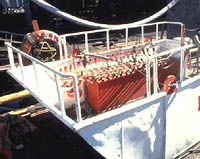Shipyard Employment eTool
General Working Conditions >> Medical Services and First Aid
Due to the hazardous work that takes place in shipyards, emergency medical services and first aid must be readily accessible (29 CFR 1915.87(a)).

Potential Hazard
Injuries to workers may worsen due to inadequate or delayed access to medical treatment.
Requirements and Example Solutions
- An adequate number of employees must be trained as first aid providers at each worksite, during each workshift unless (1) there is an on-site clinic or infirmary with first aid providers during each workshift; or (2) outside first aid providers (i.e., emergency medical services) can reach the worksite within 5 minutes of a report of injury or illness (29 CFR 1915.87(c)(1)).
-
First aid providers must be trained and maintain certification (such as issued by the Red Cross, American Heart Association, or other equivalent organizations) to render first aid, including cardiopulmonary resuscitation (CPR) (29 CFR 1915.87(c)(4) and (c)(5)).

- First aid supplies must be adequate for the size and location of each worksite, the number of employees at each worksite, and the hazards present at each worksite. In addition, first aid supplies must be readily accessible to each worksite unless an on-site infirmary or clinic containing first aid supplies is readily accessible to each worksite (29 CFR 1915.87(d)(1) and (d)(2))
- First aid supplies must be kept in a dry, sterile, and serviceable condition (29 CFR 1915.87(d)(4)). The inspection of supplies must be conducted at sufficient intervals to ensure its content is replenished and that appropriate standards are maintained (29 CFR 1915.87(d)(5) and (d)(6)).
- In areas where workers have the potential for being splashed with substances that may result in an acute or serious injury, quick-drenching facilities must be located within close proximity for the flushing of the eyes and/or body (29 CFR 1915.87(e)).
- An adequate number of basket stretchers, or the equivalent, must be provided and be readily accessible to where work is being performed on a vessel or vessel section (29 CFR 1915.87(f)(1)). However, an acceptable alternative would be for emergency response services to provide basket stretchers, or the equivalent.
- Basket stretchers, or the equivalent, and related equipment must be inspected at least once annually, if not more, to ensure the equipment remains in a safe and serviceable condition (29 CFR 1915.87(f)(4)).
For More Information
- OSHA Fact Sheet entitled, Subpart F – General Working Conditions in Shipyard Employment: Medical Services and First Aid.
- Bloodborne pathogen standard applies to qualified attendants. (29 CFR 1915.1030)
- Bloodborne Pathogen. OSHA Standard Interpretation, (July 24, 1992).
- Model Plans and Programs for the OSHA Bloodborne Pathogens and Hazard Communications Standards. OSHA Publication 3186, (2003).

